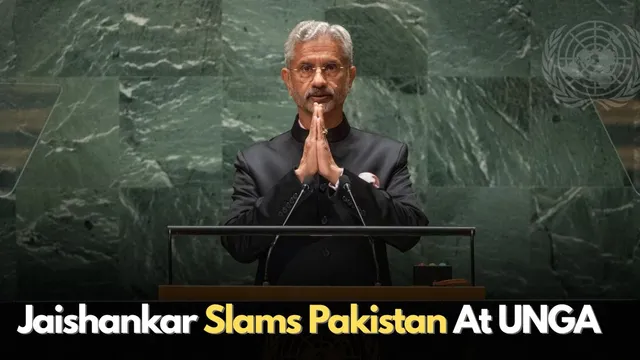- By Supratik Das
- Sun, 28 Sep 2025 12:18 AM (IST)
- Source:JND
Jaishankar UNGA80 speech: External Affairs Minister Dr S. Jaishankar, representing India at the 80th session of the United Nations General Assembly (UNGA), delivered a landmark address highlighting terrorism, global crises, and the need for multilateral reforms. Speaking as India’s primary delegate, Jaishankar referred to the country as Bharat, emphasizing its historical and contemporary commitment to global peace and security.
“Namaskar from the people of Bharat. We are gathered here, eight decades since the founding of this unique body. The UN Charter calls on us not just to prevent war, but to build peace. Not just to defend rights, but to uphold the dignity of every human being,” Jaishankar said.
Terrorism: India’s Enduring Challenge
A major focus of his address was terrorism. Jaishankar called out a neighbouring country as an epicentre of global terrorism, stressing that many major international attacks are traced back to it. “UN’s designated lists of terrorists are replete with its nationals. The most recent example of cross-border barbarism was the murder of innocent tourists in Pahalgam in April this year. India exercised its right to defend its people against terrorism and brought its organisers and perpetrators to justice,” he said.
#WATCH | At the 80th session of UNGA, EAM Dr S Jaishankar says, "India has confronted this challenge since its independence, having a neighbour that is an epicentre of global terrorism. For decades now, major international terrorist attacks are traced back to that one country.… pic.twitter.com/WNV5pJDnFe
— ANI (@ANI) September 27, 2025
He further stressed the need for global collaboration against terrorism, “Countering terrorism is a particular priority because it synthesises bigotry, violence, intolerance and fear… When terror hubs operate on an industrial scale, when terrorists are publicly glorified, then such actions must be unequivocally condemned. Financing of terrorism must be choked and relentless pressure applied on the entire terrorism ecosystem.”
Global Crises And Multilateral Action
Jaishankar spoke about energy, food, and economic challenges amplified by conflicts since 2022. “Both permanent and non-permanent membership of the Council must be expanded. A reformed Council must be truly representative. India stands ready to assume greater responsibilities,” he said.
He also underlined India’s humanitarian contributions, citing aid to Afghanistan and Myanmar during earthquakes, safe commerce, anti-piracy efforts, and India’s global peacekeeping role. “Our soldiers ensure peacekeeping, our sailors protect maritime shipping, our security counters terrorism, our doctors and teachers facilitate human development… these remain the core of our foreign policy,” he added.
UN Reforms And Development Goals
Reflecting on the UN’s evolution, Jaishankar noted, “Forces unleashed by history since the founding of the UN propelled this body forward… Membership quadrupled and its remit grew. Development goals took centre stage even as climate change emerged as a shared priority.”
He also critiqued the Sustainable Development Goals, calling them a “sorry picture” in some areas, and stressed India’s readiness to share tools, including responsible use of Artificial Intelligence for development.
Bharat’s Principles And Global Leadership
Highlighting India’s guiding philosophy, he outlined three pillars, Atmanirbharta (self-reliance), Atmaraksha (self-protection), and Atmavishwas (self-confidence). “Bharat will always maintain its freedom of choice and will always be a voice of the Global South,” he asserted.
Concluding on a note of hope, Jaishankar urged multilateralism and global solidarity, “Islands of prosperity cannot flourish in an ocean of turbulence. The ninth decade of the UN must be one of leadership and hope.”
(With inputs from agencies.)
